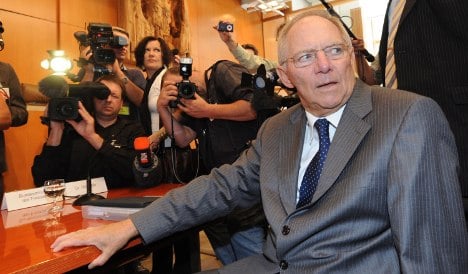Some 57 percent of voters polled by Infratest Dimap for broadcaster ARD and daily Die Welt thought Schäuble was doing a good or very good job.
Two-thirds of voters believe Germany’s economic situation is either good or very good, yet nearly three-quarters say they have not personally profited from the upswing.
Voters are neatly divided on tax cuts. Asked whether taxes should be cut from January 1, 2013 as the ruling coalition leadership recently announced it intended to do, 48 agreed with the move and 49 percent were against it.
Yet a strong majority wants to reduce the nation’s debt, Die Welt reported. Some 70 percent believed it was more important to reduce the amount of new debt the government was taking on, while 24 percent said tax cuts were a greater priority.
Defence Minister Thomas de Maizière was the second most popular politician on 56 percent approval followed by the Social Democratic Party’s (SPD) former Finance Minister Peer Steinbrück on 54 percent and the party’s parliamentary leader Frank-Walter Steinmeier on 51 percent. Chancellor Angela Merkel sits in fifth place on 49 percent.
The poll also showed that both Steinbrück and Steinmeier would win in head-to-head in direct elections against Merkel.
Voters have a cloudy image of the chancellor right now, the poll finds. Some 85 percent believe she should take greater leadership within the federal government. On the other hand, about 80 percent believe she represents Germany well on the world stage.
Two out of three voters are disappointed with Merkel’s six years in office. They do not know where she stands, the poll shows. Yet 61 percent said they felt that, on the whole, she has done a good job.
Voters are generally happier with the four years she laboured under the “grand coalition” with her party’s traditional centre-left rivals from 2005 to 2009 than they are with her current coalition with the pro-business Free Democratic Party.
The survey polled 1,000 people on July 4 and 5.
The Local/djw



 Please whitelist us to continue reading.
Please whitelist us to continue reading.
Member comments